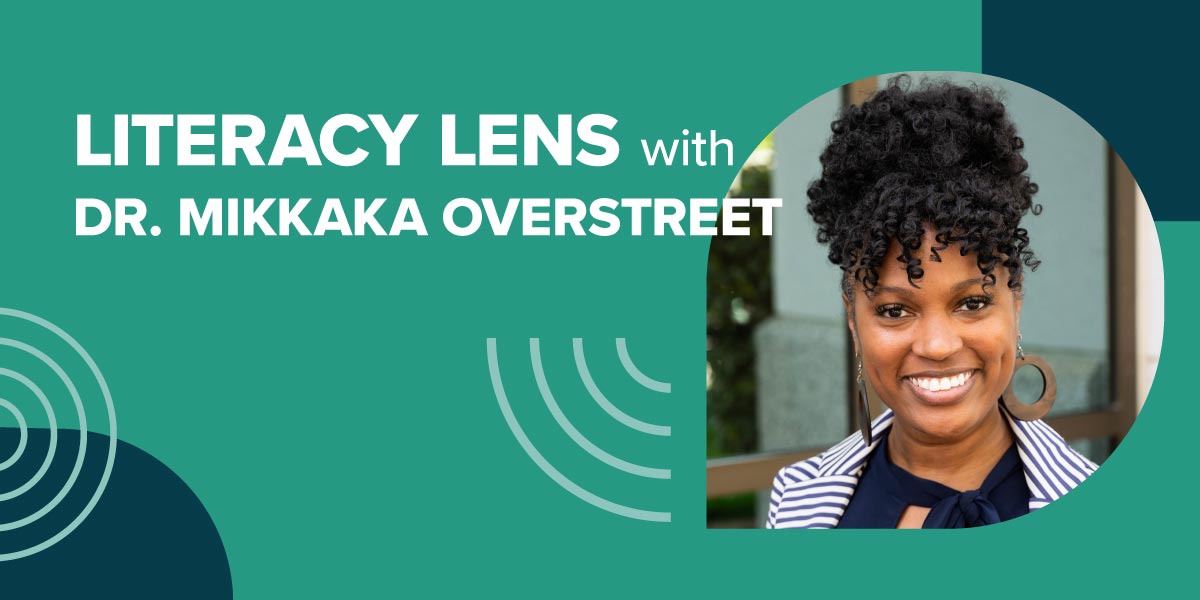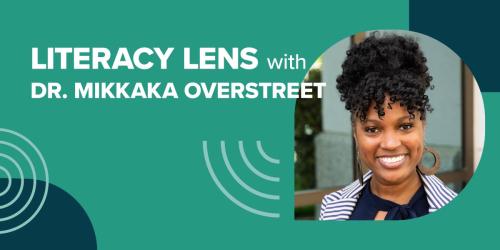Literacy Lens: New School Year, New Opportunities for Equitable Learning

As a new school year begins, I can’t help but think about the gift of a fresh start. It is akin to starting over at the beginning of a video game but retaining the extra lives and boosts and special weapons you earned on the harder levels. The great thing about teaching is that each year we have the opportunity to start again. Not only do we get to start fresh, but we also get to be more knowledgeable each time we restart. Educators—be they teachers, administrators, or any of the other members of the school village—bring a wealth of knowledge and experiences with them into each new school year.
My name is Dr. Mikkaka Overstreet, and I am thrilled to be authoring this blog series about literacy on behalf of Education Northwest. Each month, I will share my thoughts and insights on literacy and equity, along with some tools and resources that I hope will assist you in providing high-quality, evidence-based, and equitable literacy education. My passion for literacy began when I was a child, and it carried me through my years as an elementary school teacher, literacy consultant, and literacy professor. Now, with this blog, I get another new beginning and a new opportunity to support educators and children. Thank you for embarking on this new journey with me.
It is truly a gift that we as educators get to start each school year with more knowledge and skill than the year before. Furthermore, we get to extend this same grace to our students. They, too, show up full of knowledge and experiences, hopes and dreams, and endless potential. They have carefully picked their first-day-of-school outfits, complete with cool shoes they can’t wait to show you. They often have new backpacks full of shiny pencils, sharp crayons, and crisp, empty notebooks ready to be filled. They’re excited to see the décor of their new classrooms, the careful seating arrangements you’ve made, the classroom library, and you—their teachers, principals, counselors, cafeteria workers, custodians, and all the other adults who will guide them in their learning about words and the world in this new school year.
Literacy, like any aspect of education, cannot be separated from equity. At Education Northwest, we believe that access to quality literacy education is a fundamental human right.
How can we make the most of the gift of starting anew? How can we ensure that this year is a good one for ALL students? For Black, Brown, and Indigenous students? For multilingual learners? For students who live in poverty? For students with disabilities? For kids who have reading difficulties or behavior challenges? How can we prove to children that no matter what may have happened last year, last week, or last class period, they have a fresh chance to be successful, and we are committed to helping them get there?
I contend that in order to make the most of this new opportunity and do right by all children, we must start with equity in mind. You’re probably saying to yourself, ‘Wait, I thought this was a literacy blog,’ and you are correct. Literacy, like any aspect of education, cannot be separated from equity. At Education Northwest, we believe that access to quality literacy education is a fundamental human right.
Start Anew with An Equity Lens
It is imperative to begin with the end in mind. If your school or district has the goal of creating an inclusive environment in which every learner’s needs are met, it will require intentional planning and action. Equity cannot be an afterthought. Luckily, it’s never too late to start fresh with an equity mindset. This applies to all decision making related to literacy, including curricula, materials, and even the amount of time dedicated to literacy instruction.
At Education Northwest, we’ve learned a lot about leading with equity. Recently, we partnered with Evergreen Public Schools in Washington to help them attain their goal of moving toward equity. We conducted an equity audit to collect actionable information and explore equity in the recruitment, hiring, and retention of staff members of color; educator quality; student access to learning opportunities; and student achievement. As we noted in that equity audit, "expanding access to culturally and linguistically responsive education" is one of the top evidence-based, long-term strategies to address current disparities in outcomes between demographic groups (Education Northwest, 2020).
Armed with this data, the district took action. They chose to start fresh with equity at the forefront of their decision making. Among other steps, they have developed a tool—their Equity Lens. The tool is divided into five areas: purpose and connection, engaging stakeholders, opportunities for equity, barriers to equity, and changing actions. For each area, there are guiding questions for users to consider. For example, under barriers to equity, users are asked to consider unintended consequences for specific populations and to address how they plan to track progress toward reducing disparities.
I had the privilege of co-facilitating a weeklong training session aimed at deepening school and district leaders’ understanding of culturally responsive practices and the capacity to leverage the Equity Lens. Participants had the opportunity to explore the conditions and opportunities within their design, implementation, and decisions to advance racial equity. Although it was the week before the start of the school year, the participating leaders prioritized this learning opportunity so they could start the new year with equity in mind.
It was so powerful to see how deeply engaged and committed the district and school leaders were throughout the intensive session. They were reflective, vulnerable, and open—all crucial components of doing the deeply personal work of ensuring an equitable environment for students and staff.
What I found most inspiring was how committed these leaders were to taking concrete action. They each expressed plans for applying the Equity Lens and other tools and strategies they had acquired. When asked why they felt compelled to act, one participant said “I think we all feel more equipped thanks to the resources we’ve received and the work we’ve done this week … it feels empowering.”
What might education look like if all educators and school leaders felt similarly empowered to take intentional action related to equity? Within the field of literacy, for example, how might the books and other materials in classrooms look differently than they currently do? If educators were more reflective, vulnerable, and open when planning reading and writing instruction, how many more children would see themselves reflected and valued in the curriculum?
Call to Action: Commit to Culturally Responsive and Equitable Literacy Practices
While I plan to share more research, instructional strategies, and specific examples in future posts, I want to leave you with some resources and tools you can use right now. The following will help you start your school year with an equity lens.
Culturally Responsive Teaching: A Guide to Evidence-Based Practices for Teaching All Students Equitably
This guide provides a wide range of practices—supported by research—that can help prepare educators to become more culturally responsive in their approach to teaching.
Equity Leadership Team Protocol
The protocol presented in this booklet is intended as a guide for designing the structure, role, and work of the Equity Leadership Team.
Equitable Learning Environments Framework and Theory of Action
In this resource, we lay out Education Northwest’s framework and theory of action for equitable learning environments. We describe what equitable learning environments look like, list adult practices that make learning environments equitable, and outline the positive individual and community outcomes that equitable learning environments support.
Promoting Success for Teachers of English Learners: A Coaching Tool
This overview highlights the transformational impact that targeted, iterative, and regular observation and feedback can have on improving teaching practice. It also highlights the need to provide specialized support for teachers with ELs in their classrooms.
Resources for Building Teacher-Student Relationships
A collection of blog posts, videos, education research, and websites to help teachers strengthen their relationships with all their students.
As the lifelong learners we should be, educators are continuously growing in our craft. Whether we are starting a new year, new semester, new day, or new lesson we get to apply everything we have learned along the way. My favorite quote from L.M. Montgomery’s Anne of Green Gables is “Isn’t it nice to think that tomorrow is a new day with no mistakes in it yet?”
As you start this new school year, take some time to pause and reflect on your practice. How can you make this next lesson a little better? How can you improve your next interaction with a student? What can you do differently to improve teaching and learning in your context? Are you looking and teaching through your equity lens? It’s a new day. Now is your chance.
Literacy Lens with Dr. Mikkaka Overstreet is a monthly blog series that offers insights on literacy and equity, along with tools and resources aimed at providing high- quality, evidence-based, and equitable literacy education.



